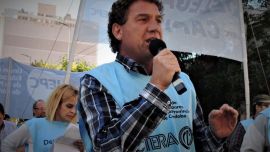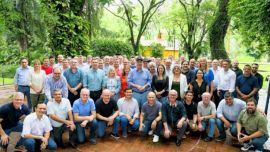Amid massive protests over the last few days in Argentina’s famous wine-producing region, Mendoza’s Legislature on Friday offered the green light to mining in the province, a development that paves the way for a wide array of investments in copper, silver and gold extraction projects, officials say.
At the tail-end of last week, lawmakers approved a new version of Law 7722 – first passed in 2007, under then-governor Julio Cobos – which had previously restricted the use of dangerous chemicals in mining operations and blocked water-intensive projects in the region amid concerns over their environmental impact.
The provincial legislature greenlighted the modification of the law with 36 votes in favour, 11 against, one abstention and one absence in the lower chamber, and 28 votes in favour and seven against in the upper chamber. The proposal was presented by Mendoza’s governor Rodolfo Suárez (Unión Cívica Radical, UCR) and the modifications were approved thanks to an agreement between Radicals and Peronist lawmakers.
On Sunday, the governor announced 19 new mining projects, which he says will create new jobs and provide funds for public works in the province.
Protesters, backed by the environmental NGOs and activists, have widely rejected those claims, saying the alterations weaken environmental protections and contaminate the region’s water.
Demonstrators have staged regular protests against the modifications. On Friday, roadblocks were put in place by protesters on national and provincial routes, while campaigners marched through the streets on Sunday.
It emerged Monday that four people were arrested after making telephone threats against Governor Suárez over the weekend. His mobile phone number began circulating on social media networks last week as anger at the decision grew.
On Monday, tensions peaked. Clashes were witnessed between demonstrators and the security forces, with one group of protesters throwing rocks at police in riot gear. Officers with tear gas and fired rubber bullets from the security forces.
ALTERATIONS
Suárez sees in mining a potential source of public revenue and job creation, thanks to new extraction projects in different locations. Business chambers have been strong supporters of the law’s alteration too, amid a rise in unemployment in the province, now at 10 percent.
Under the modified law, the use of cyanide and sulfuric acid in mining activities in the province is now approved, though the use of mercury remains forbidden.
Companies will also now have to submit an Environmental Impact Assessment specific to water resources and a general report that includes responses from various government agencies.
Mendoza has 19 mining proposals waiting for final approval. Most of them focus on copper extraction but there are also gold, silver, lead, zinc and uranium projects on the drawing board.
According to the provincial Chamber of Mining Businesses, the modification of the law will allow for the reactivation of the mining sector which, in turn, would bring in resources valued in US$349.2 million.
A study by the Chamber revealed that if only six projects get permitted, over 17,000 jobs would be created during the construction phase and more than 39,000 once they go into production.
“This is a key step towards the economic development of the province and job creation,” said Julio Torero, head of the Metallurgical Industrial Association of the province.
Wide rejection
Such arguments, however, have been widely rejected by environmental groups, union leaders and especially citizens in the municipalities near the famed wine-growing region of Valle de Uco, which is already dealing with water scarcity. The expansion of mining could make access to water even more difficult, they argue.
More than 2,000 people gathered outside the provincial legislature when the law was changed on Friday. Later, massive protests followed in different locations of the province. There were blockades in route number 40 which goes to Mendoza’s central region, as well as Ruta 7 at Uspallata, which crosses the Andes and leads to Santiago in Chile
Laura Vidal, a campaigner at Greenpeace, said in a statement to the press that it’s “derisory the fact that the province decided to favour the polluting mining [industry] at the same time it is dealing with the worst drought it has ever seen – instead of actually taking care of the few water resources it has.”
On Sunday, hundreds took to the streets again in what was called the largest protest on the history of Mendoza. The march began in San Carlos municipality in Valle de Uco and will continue throughout the week week, ending with a protest at the provincial capital demanding the law’s alterations be declared unconstitutional.
“By authorising the change in the law, the Legislature is rolling back 12 years of protection of our water resources and environment,” Jorge Difonso, a provincial lawmaker, said. “We are facing growing problems to have access to water for agriculture and human consumption. We support economic development, but it has to be sustainable.”
Responding to the criticism, provincial Environment Secretary Humberto Mingorance issued a press release claiming that water resources won’t be compromised, nor would any negative impact be felt on the environment.
“Our environmental police will control every mining project that could have an environmental impact,” Mingorance said. “We’ll also carry out public hearings in all the areas where projects might be carried out.”
"The ruling party of the Frente Cambia Mendoza and the Partido Justicialista Mendoza Front voted for and against the law. Let's say it was not voted for in a block. So this is representative. We are going through democratic institutional channels," said the head of the environmental portfolio.
According to government statistics, up to 81 percent of the water resources in the province is used by agriculture, with a 45 to 50 percent efficiency – which means that half the water is actually lost before making it to the crops.


























Comments